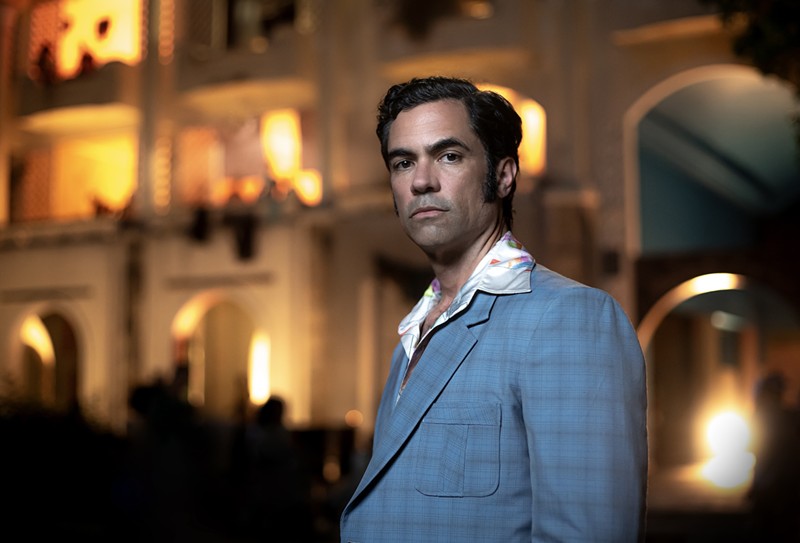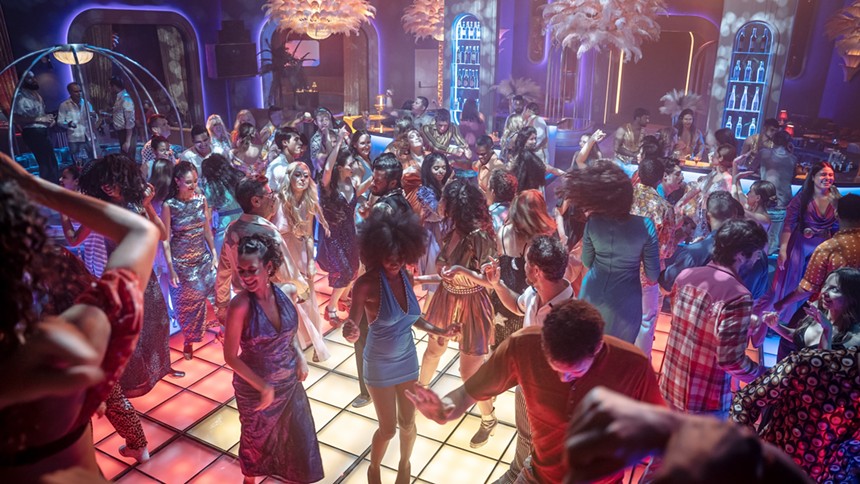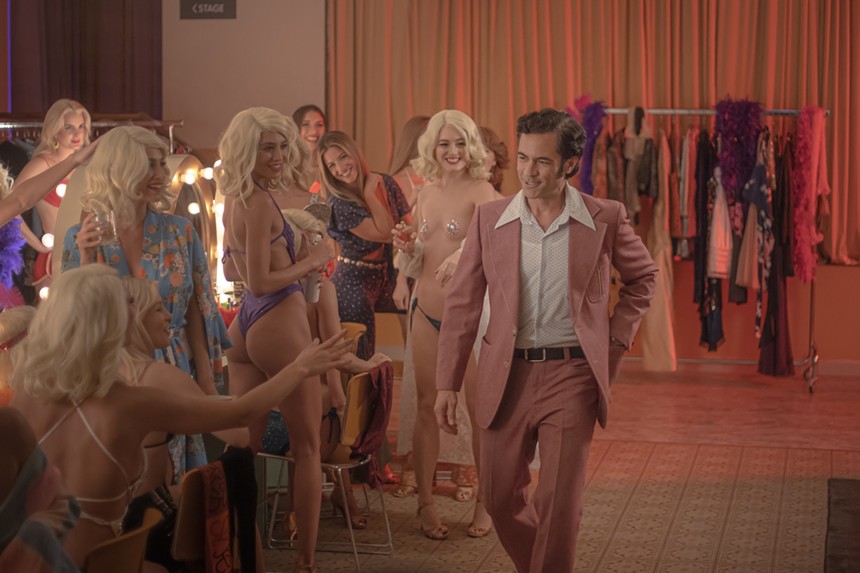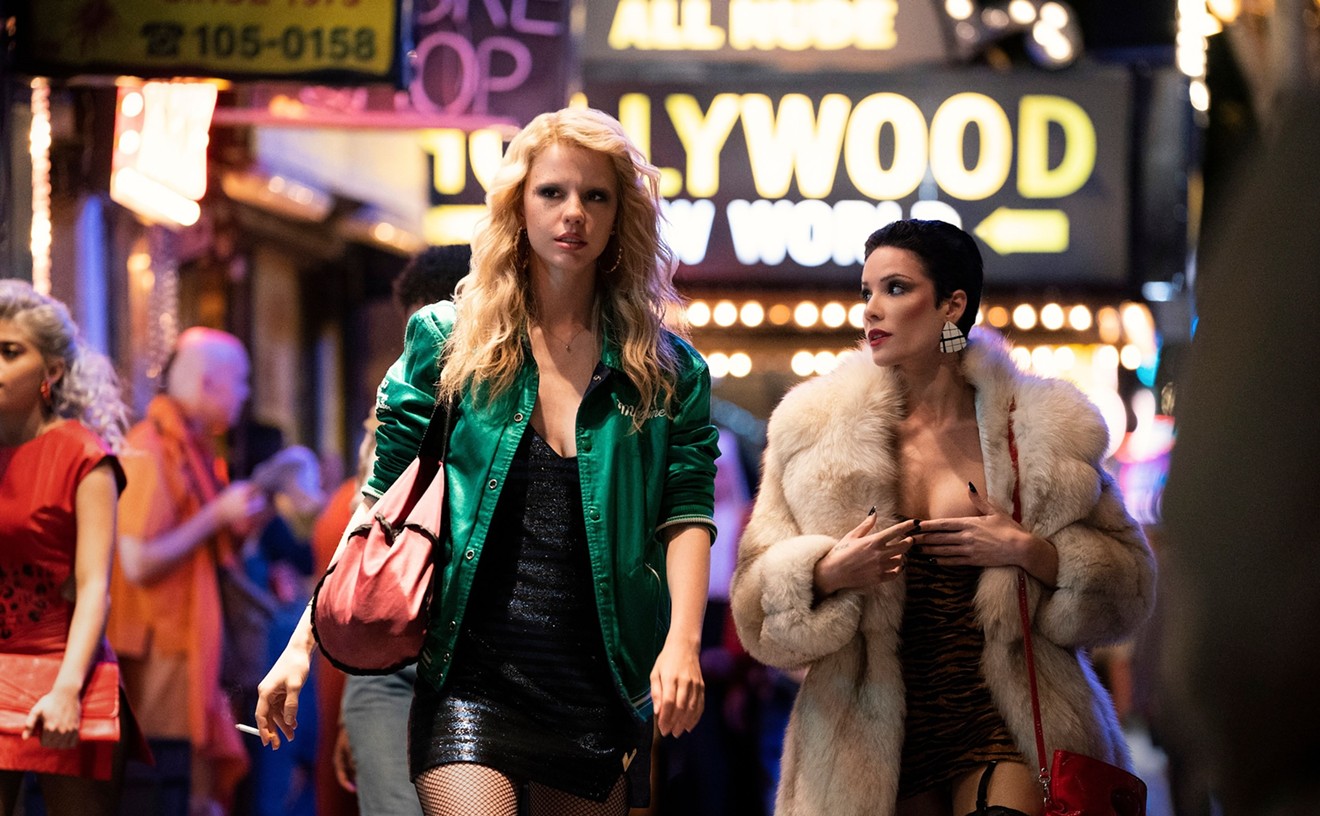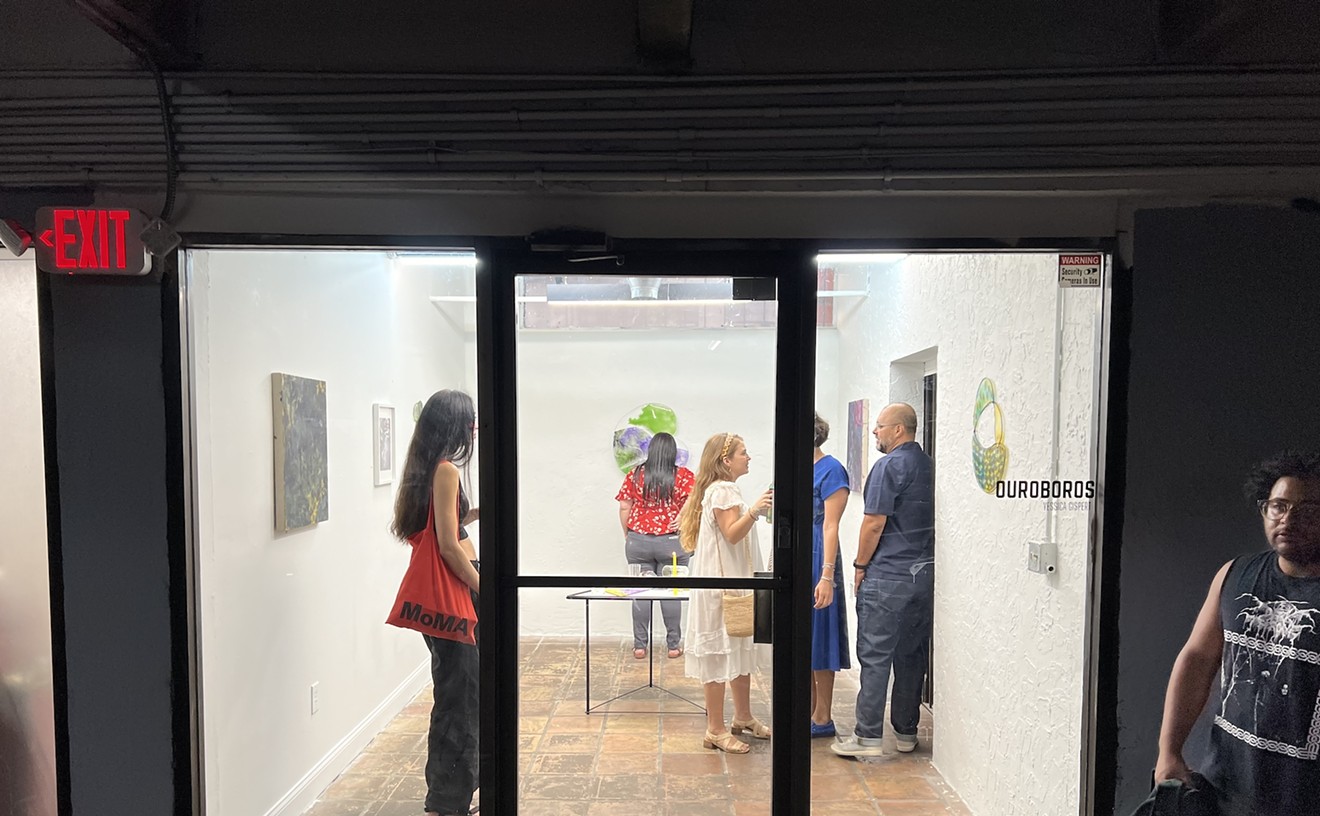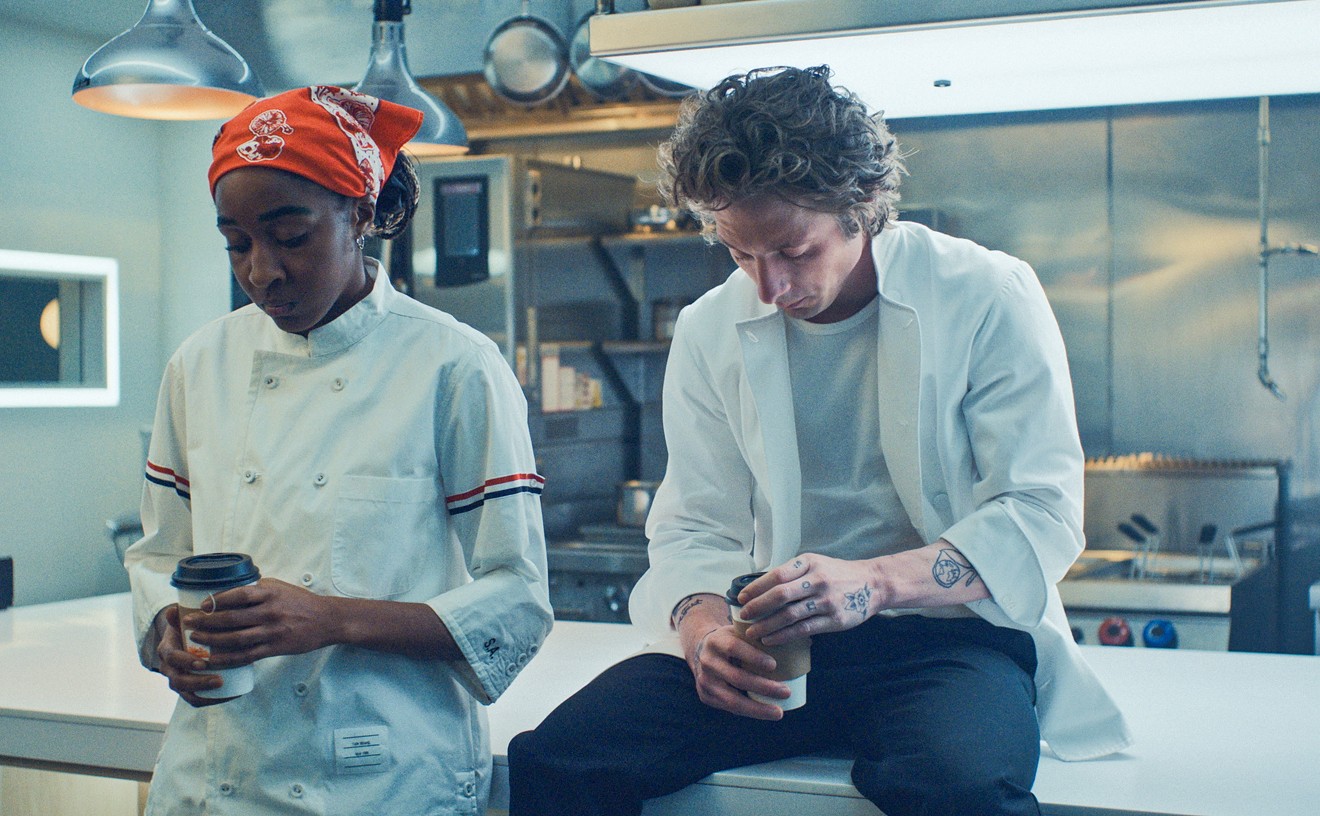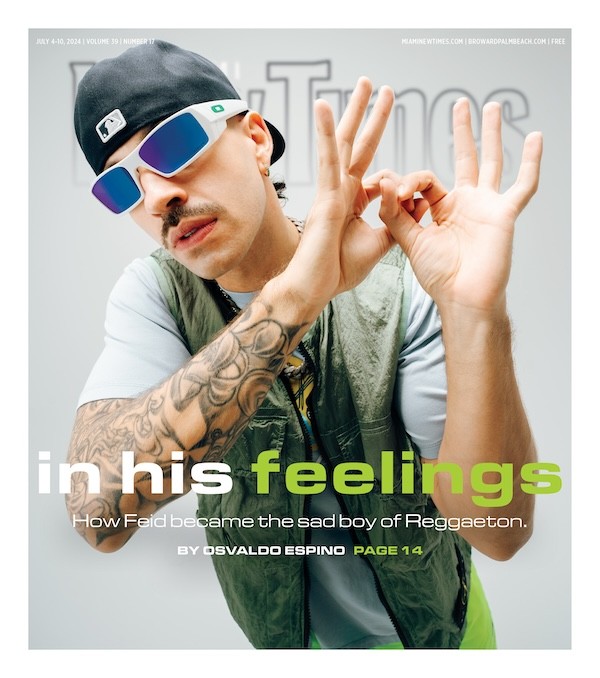You already know the story. Miami. The 1970s. The Mutiny Hotel and nightclub. Miami's version of Casablanca and the epicenter of drugs, disco, and decadence. (How I hate those trite, overused, but accurate expressions.) We've seen it all before: Scarface, Miami Vice, Griselda Blanco, the Godmother of Cocaine, in versions one and two, featuring Catherine Zeta-Jones and Sofia Vergara, both miscast, respectively. (Rosie O'Donnell, with her diminutive mustache, would have been a better alternative.)
It was a good thing that Flipper was set in the 1960s, not the 1970s, or that poor dolphin would have been bumping into bales of marijuana and kilos of cocaine. "Oye, jefe. ¡El delfin es un narco!” And we've had a slew of documentaries thanks to the team of Billy Corben and Alfred Spellman: Cocaine Cowboys, one, two, et al.
So, now we have MGM+'s Hotel Cocaine, created by Narcos and The Godfather of Harlem producer Chris Brancato, who also helped make Hannibal, Law and Order: Criminal Intent, Law and Order: SVU, and Boomtown critical successes.
The series is based on a real place (the Mutiny) and an individual (Roman Compte, who worked at the historic institution). Roman is played by Danny Pino, a competent actor whose backstory is that of a Cuban refugee who had fought at the Bay of Pigs. The chronicle opens as Roman, the club manager, takes us into the nightclub, serves as the narrator, and provides us with a Weltanschauung worldview of the interior life of the Mutiny. Glamorous waitresses are serving Dom Perignon, patrons are snorting lines of cocaine, and celebrities abound, "Look, it's Liza Minnelli!" and "Hey! That's John Bonham from Led Zeppelin."
Soon, we see Roman lured away from the bar by DEA Zulio (Michael Chiklis, a more gifted and complex actor who shined in The Shield), who wants him to set up his older brother, Nester Cabal, a top Miami cocaine trafficker. The pressure that Zulio applied threatens to set Compte up, forcing him to give up his daughter. Along the way, we meet Burton Greenberg, based on another real individual (née Burton Goldberg) who owned the Mutiny, played by Mark Feuerstein (a fellow "lantzman" who comicalized the role inauthentically), and several minor cast members.
Compte uses one of the Mutiny waitresses to locate his brother, played by Yul Vazquez, the series' most realistic and accurate performance. (Yul actually resembles the real Compte, who I knew in the 1970s.) Another plot complication is that Nester has just been "ripped off" by a Haitian gang, and he wants to retrieve his merchandise. To prove his loyalty, Roman executes one of Nestor's men and helps his brother go after his enemies. Along the way, Agent Zulio is misdirected to another location. End of the first episode.
Hotel Cocaine lacks the pulsing, brilliant soundtrack of Miami Vice, created by Jan Hammer, a music video on crack, or the dazzling cinematography, a hallmark of the show that metamorphosed the image of Miami to the rest of the nation, and the genius of Michael Mann, a virtuoso, director, writer, and producer. Miami Vice, with its B-movie plot, was elevated due to the scintillating construct; Hotel Cocaine remains a low-budget commercial production, lacking vision, scope, or a compelling narrative.
If I were to debate Brancato on the virtues and vices of Hotel Cocaine, it would be a simile to the Lloyd Bensen and Dan Quayle vice-presidential debates.
Brancato (as Quayle): "Sir, I am quite familiar with the history and workings of the Mutiny Hotel."
Me (as Bensen): "I know the Mutiny. I was a member of the Mutiny. I trafficked cocaine from the Mutiny and was there five nights a week from 1976 until it closed its doors in 1986. You, Sir, do not know the Mutiny."
Or something to that effect. What I said above is true. (Well, maybe four nights a week.)
To refresh my memory, I called numerous friends who either worked at the Mutiny. Chuck Volpe, Mutiny manager for eight years who was Roman Compte's superior (Roman only worked on the property for just over a year); Mollie Scruggs, Pam Suarez, and Debbie Landsberger, all long-time hostesses; other employees who wished to remain anonymous; and several of my colleagues who were into, shall we say, "recreational pharmaceuticals."
The Mutiny was a membership club, not a disco, although some disco music was played; much was a heady mix of Latino artists like Willie Colon, Hector Lavoe, and my personal favorite, Ruben Blades (Pedro Navaja). The dance floors seemed like an afterthought. It was not the light show with strobes and lasers as portrayed in Scarface (the Babylon Club) or Griselda and certainly not in Hotel Cocaine. Poetic license? Sure. I believe in it, especially in "fictional accounts" based on real places and events. But, to me, Hotel Cocaine's producers demonstrated a certain carelessness or laziness that need not have happened.
What is more concerning is the portrayal of certain individuals included in the story. I knew Burton, the club owner. He was not some cokehead who couldn't wait to do his next line. He was thoughtful — an entrepreneur — who made his mark in Miami and went on to more success. He has friends and family still alive. Why portray him in such a harsh, negative light?
The Mutiny, as a character in Hotel Cocaine, should inform the audience, particularly in our community, of a particular era and offer a perspective on how a certain group of individuals approached life. Marshall McLuhan, "the Father of Media Studies," believed television should "enhance" viewers' perceptions.
And the Mutiny girls? They did not wear spandex, bare midriffs, or pasties. The female employees were elegant, in long dresses and mandatory hats. And the men who attended the club, at least the regulars, preferred Italian-cut suits. (I wore Brioni.)
Yes, there were tons of celebrities who attended the nightclub. Over the years, I befriended boxers Hector "Macho" Camacho, Alexis Arguello, Roberto Duran, and many other professional athletes. And movie stars, from Paul Newman to Al Pacino to Don Johnson, were present. Musicians from, yes, Rick James to Julio Iglesias to many artists who recorded next door at Bayshore Studio — Crosby, Stills, Nash & Young (they have a song called "Mutiny") and the Eagles. (I remained friends with Glen Frey for more than 40 years.)
And numerous politicians. One night, I was sitting with my mentor (table two, upper deck), Bay of Pigs veteran and local legend Bernardo de Torres. Burton, as custom, brought celebrities over to shake his hand; this time, it was Senator Ted Kennedy. When I saw the senator come over, I had to wince. A few years earlier, Bernie was brought in front of the House Committee on Assassinations concerning his involvement in the possible killing of the senator's brother, John F. Kennedy; you can't make this stuff up.
Yes, the Mutiny made strange bedfellows; ask my friend Raul Diaz, retired homicide detective and member of CENTAC, who investigated major drug murders and brought down Griselda Blanco. On any given night, there were undercover law enforcement officers, local, state, and federal, including the FBI, DEA, and CIA. Oh, did I forget to mention it was my older brother who prosecuted Griselda Blanco while I spent my life in, let's say, other more profitable pursuits?
Clearly, the plot in Hotel Cocaine with brothers on opposite sides of the law resonated with me in some small way, and like in the show, I also changed the spelling of my last name. But critically? I'd say it is a clichéd device seen much too often in movies and television.
Overall, I wish Chris Brancato had delivered a much better product.
For those interested in the Mutiny, I suggest you read Roben Farzad's book, Hotel Scarface: Where Cocaine Cowboys Partied and Plotted to Control Miami. Pay special attention to chapter 15; it masterly tells the story of an accomplished, handsome young lad (me) who was seduced by the luminescent glow of the Mutiny, much like J. Gatsby was fixated by the green light on the dock outside Daisy Buchanan's East Egg mansion. Now, that would have made a hell of a series.
Hotel Cocaine. Starring Danny Pino, Yul Vazquez, Mark Feuerstein, and Corina Bradley. Created by Chris Brancato. Rating TV-MA. New episodes Sundays at 10 p.m. on MGM+.
[
{
"name": "Air - MediumRectangle - Inline Content - Mobile Display Size",
"component": "19274298",
"insertPoint": "2",
"requiredCountToDisplay": "2"
},{
"name": "Editor Picks",
"component": "17482312",
"insertPoint": "4",
"requiredCountToDisplay": "1"
},{
"name": "Inline Links",
"component": "18711090",
"insertPoint": "8th",
"startingPoint": 8,
"requiredCountToDisplay": "7",
"maxInsertions": 25
},{
"name": "Air - MediumRectangle - Combo - Inline Content",
"component": "17482310",
"insertPoint": "8th",
"startingPoint": 8,
"requiredCountToDisplay": "7",
"maxInsertions": 25
},{
"name": "Inline Links",
"component": "18711090",
"insertPoint": "8th",
"startingPoint": 12,
"requiredCountToDisplay": "11",
"maxInsertions": 25
},{
"name": "Air - Leaderboard Tower - Combo - Inline Content",
"component": "17482313",
"insertPoint": "8th",
"startingPoint": 12,
"requiredCountToDisplay": "11",
"maxInsertions": 25
}
]

